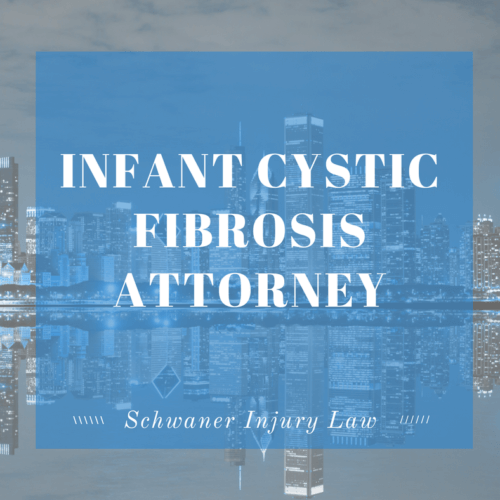
Infant Cystic Fibrosis Attorney
Cystic fibrosis is caused by a DNA mutation that results in a life-threatening disease that is the most common genetic disorders in the United States.
The mutation impacts the way salt moves in and out of cells, and causes thick mucus to form throughout the body, but primarily in the lungs, that can not only make breathing difficult, but can also create an environment that’s ideal for lung infections, since bacteria can easily grow in the sticky mucus.
Cystic fibrosis (CP) is more common in children with Northern European roots, and it occurs when both the mother and father carry a defective CF gene. According to estimates, more than 10 million Americans carry the defective CF gene.
According to the March of Dimes, cystic fibrosis impacts about 30,000 children and adults in the United States. That’d about 1 in every 3,500 babies.
There is no cure for the disease.
Symptoms of Cystic Fibrosis
For about 15 to 20 percent of children born with cystic fibrosis, meconium, the first stool produced in a fetus’s intestines, will cause a blockage in the small intestine, potentially causing the intestine to twist or fail to develop properly. The large intestine is sometimes also obstructed, so the meconium, which is usually expelled shortly after birth, isn’t part of a bowel movement until several days after birth.
Other symptoms include:
- Coughing and wheezing that fails to improve.
- A failure to gain weight during the first few weeks following birth.
- Salty skin.
- A large appetite that is not accompanied by weight gain.
- Large, greasy bowel movements.
- Bloating and/or stomach pain.
- A lot of mucus in the lungs.
- A propensity for developing lung infections including bronchitis and pneumonia.
- Shortness of breath.
Newborns are screened for cystic fibrosis at birth through a blood test checking for a protein anomaly that if present will require further testing in order to determine definitively whether or not the child has the disease.
Parents who are concerned about cystic fibrosis can undergo genetic testing to determine if they are carriers of the CF gene.
Complications Associated with Cystic Fibrosis
In addition to breathing difficulties, children with cystic fibrosis have thickened digestive juices that are unable to reach the small intestine, making it more difficult for the body to break down and absorb nutrients taken in from food, causing both digestive and growth issues.
Because of the lung problems as well as the inability to take in nutrients effectively, cystic fibrosis generally leads to a shortened life span. The average age children born with the disease live to is about 37, although this is an improvement from previous decades, when children usually only lived into their teens.
While the proper treatment can make those years relatively normal, there are a host of other complications associated with cystic fibrosis, including:
- Damaged, thinning airways that can make it more difficult to breathe and could eventually lead to coughing up blood.
- Chronic infections.
- Inflammation of the nose that causes nasal polyps to develop.
- Respiratory failure. Because symptoms of cystic fibrosis grow progressively worse, over time, lungs can cease to function due to excessive damage to lung tissue.
- Because cystic fibrosis negatively impacts the pancreas, those with the disease often have difficulty producing insulin, which is used to control blood glucose levels. According to the Mayo Clinic, 30 percent of those with cystic fibrosis will also develop diabetes.
- Reproductive complications. Men with cystic fibrosis are almost always infertile because the vas deferens either becomes blocked with mucus or is missing entirely due to genetic anomalies. Women are often able to conceive and carry a child to term, but pregnancy worsens symptoms of CP.
- Because of the lack of nutrients, those with cystic fibrosis often develop osteoporosis, which causes bones to become thin and brittle.
- Electrolyte imbalances. Those with cystic fibrosis tend to sweat out more salt, leading to a potential imbalance of minerals that can cause low blood pressure, weakness, and fatigue, as well as an elevated heart rate.
Treatment for Cystic Fibrosis is Ongoing
Babies who have cystic fibrosis will require near-constant care, including tests for lung infections and regular vaccinations such as annual flu shots after six months of age.
Most children with the disease take prescription medications to treat infections, break up mucus in the lungs and control inflammation that damages the lungs over time.
Other methods of breaking up mucus include chest thumping, which is performed several times a day for 30 minutes at a time, either by hand or via machine.
Supplements that help encourage the pancreas to create bile to aid digestion, ensuring that more of the nutrients that your child consumes will be absorbed, will likely also be part of your child’s daily routine. Ensuring the intake of nutrients is important, because it helps improve health so that other CP treatments are more effective.
Future treatment options may include gene therapy, drugs to help improve how salt moves through cells and new drugs that can help prevent or treat infections.












